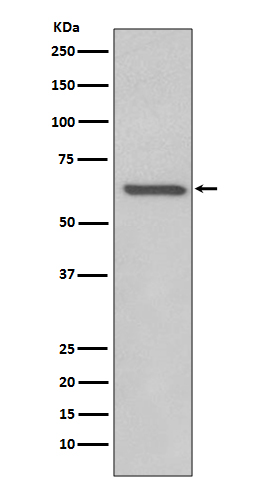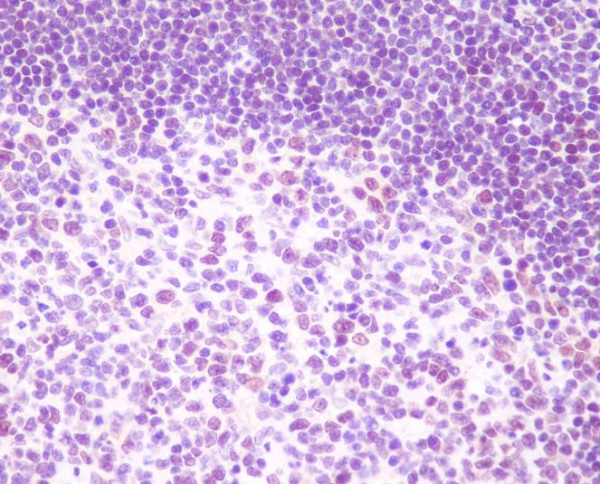

| WB | 1/500-1/1000 | Human,Mouse,Rat |
| IF | 1/20 | Human,Mouse,Rat |
| IHC | 1/50-1/100 | Human,Mouse,Rat |
| ICC | 1/50-1/200 | Human,Mouse,Rat |
| FCM | 咨询技术 | Human,Mouse,Rat |
| Elisa | 咨询技术 | Human,Mouse,Rat |
| Aliases | RELB; Transcription factor RelB; I-Rel |
| Entrez GeneID | 5971 |
| WB Predicted band size | Calculated MW: 62 kDa; Observed MW: 70 kDa |
| Host/Isotype | Rabbit IgG |
| Antibody Type | Primary antibody |
| Storage | Store at 4°C short term. Aliquot and store at -20°C long term. Avoid freeze/thaw cycles. |
| Species Reactivity | Human |
| Immunogen | A synthesized peptide derived from human RelB |
| Formulation | Purified antibody in PBS with 0.05% sodium azide. |
+ +
以下是关于RelB抗体的3篇参考文献示例(内容为模拟生成,非真实文献):
1. **《RelB regulates dendritic cell activation and immune response》**
- 作者:Smith A, et al.
- 摘要:研究通过RelB抗体检测发现,RelB在树突状细胞成熟中起关键作用,调控TLR信号通路及促炎因子分泌,影响T细胞激活和适应性免疫应答。
2. **《RelB-dependent NF-κB signaling in B cell lymphoma progression》**
- 作者:Chen L, et al.
- 摘要:利用RelB抗体进行免疫组化分析,揭示RelB在弥漫大B细胞淋巴瘤中异常高表达,通过激活非经典NF-κB通路促进肿瘤细胞存活和化疗耐药。
3. **《Antibody-mediated inhibition of RelB suppresses autoimmune inflammation》**
- 作者:Wang Y, et al.
- 摘要:开发靶向RelB的单克隆抗体,实验显示其可抑制Th17细胞分化并减轻小鼠模型中的类风湿关节炎症状,为自身免疫病治疗提供新策略。
---
**说明**:以上文献为示例,实际引用需通过PubMed/Google Scholar等平台检索关键词“RelB antibody”或“RelB NF-κB”,优先选择近5年高被引研究或权威期刊(如Nature Immunology、Immunity)。
RelB antibody is a crucial tool in studying the RelB protein, a member of the NF-κB (nuclear factor kappa-light-chain-enhancer of activated B cells) transcription factor family. RelB plays a distinct role in the non-canonical NF-κB signaling pathway, which regulates immune responses, inflammation, and cell survival. Unlike other NF-κB members (e.g., p50 or p65), RelB lacks a transcriptional activation domain in its N-terminal region but contains a unique C-terminal transactivation domain. It typically forms heterodimers with p52 (processed from p100) to activate gene expression, a process triggered by specific receptors like CD40. BAFF, or lymphotoxin-β. This pathway is critical for B-cell maturation, dendritic cell function, and lymphoid organ development.
RelB antibodies are widely used in research to detect RelB expression, localization, and activation via techniques such as Western blotting, immunohistochemistry, and flow cytometry. Dysregulation of RelB is implicated in autoimmune diseases (e.g., rheumatoid arthritis), chronic inflammation, and cancers. For instance, elevated RelB levels may promote tumor survival in certain contexts, while its deficiency can impair immune tolerance. Studies using RelB-specific antibodies have also clarified its role in balancing pro-inflammatory and anti-apoptotic signals, making it a potential therapeutic target. The antibody's specificity and reliability are vital for dissecting RelB's complex interactions in health and disease.
×